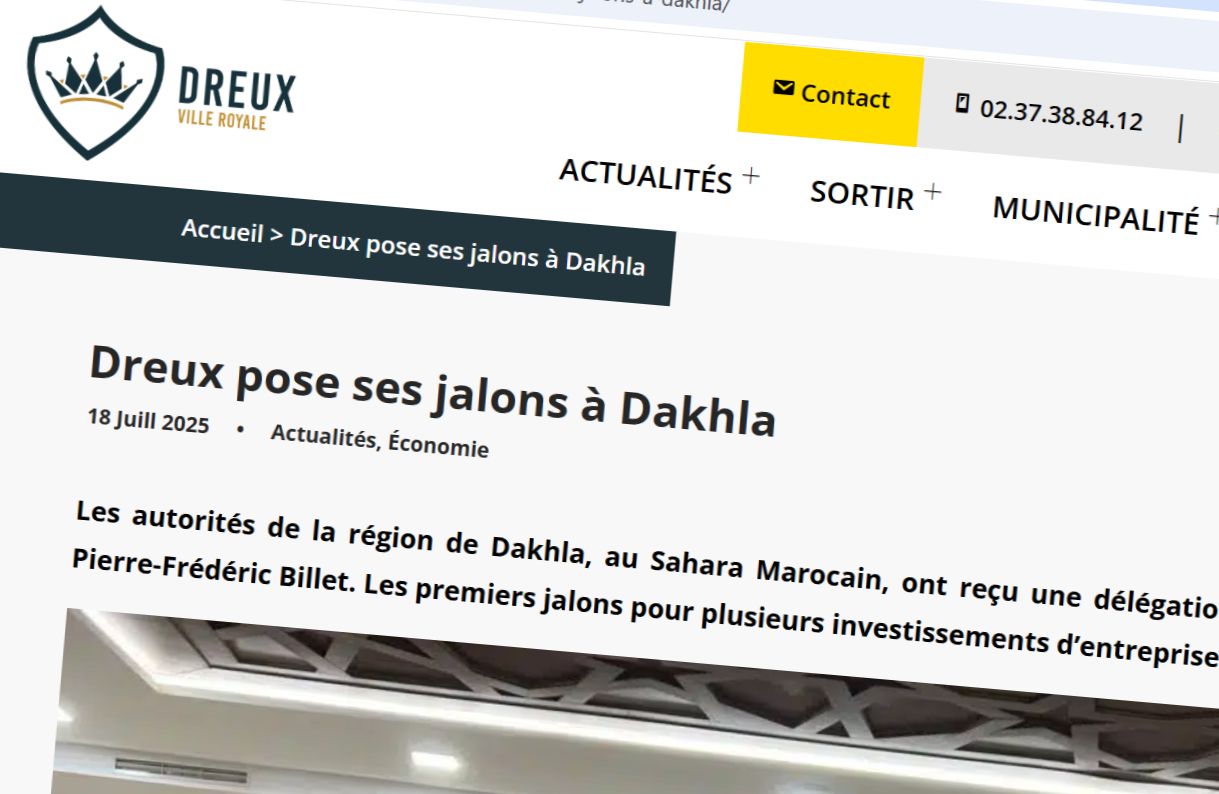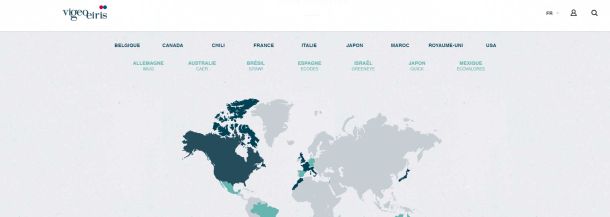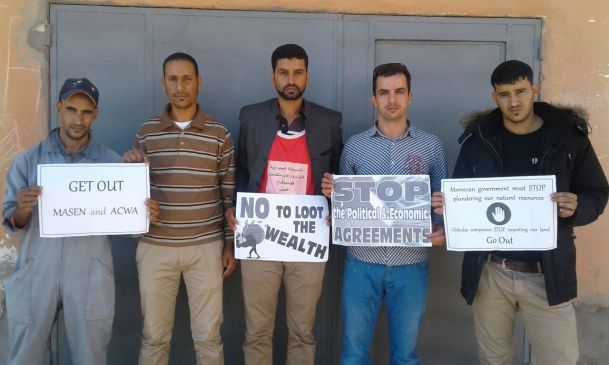
WSRW has never received a response that politically propagated the occupation to the degree as the one received from a French campaigner for Morocco on behalf of renewable energy company HDF Energy.
In November 2023, French green hydrogen developer Hydrogène de France (HDF Energy) announced that it had teamed up with the Moroccan company Falcon Capital Dakhla to install an 8 GW green hydrogen production plant in Dakhla, a town located along the coastline of occupied Western Sahara.
Western Sahara Resource Watch’s letter to the stock-exchange registered company, outlining concerns and questions as to how the firm relates to the legal aspects of operating in a non-self-governing territory through an occupying regime, was answered not by HDF Energy itself, but by a lawyer of Paris-based law firm Michel Ladoux & Associates.
Unusual as that might be - queries tend to be responded to by the companies themselves - the content of the response is perhaps even more mind-boggling: the answer from the lawyer does not contain a single legal element. Instead, it is a collage of political assertions typically employed by Moroccan officials in defence of their nation’s untenable claim over their neighbouring country to the south. The letter is the most spectacular sort of apologetics for the occupation that WSRW has seen in over 20 years of company correspondence.
- The lawyer refers to the territory not a single time as “Western Sahara”, but rather as “Sahara marocain” or “Sahara”;
- The letter incessantly refers to the Moroccan autonomy proposal, but never as only one of the options that the Saharawis can freely choose from. In fact, the entire aspect of self-determination is nowhere to be found;
- The international court cases that underline the Saharawi right to self-determination are labelled as “biassed litigation practices”;
- It reproduces a classic Moroccan propaganda narrative that the people who in fact fled from the territory following Morocco’s invasion are today held against their will, “kidnapped” or “sequestrated”;
- It blames WSRW and other international organisations for preserving the status quo, for jeopardising “the future of the populations who are sequestered” and for putting at risk “the prosperity and stability of the Sahel”.
Read the astounding letter here.
“Having visited the region on several occasions and, just a few days ago as part of a debate on peace and interreligious tolerance in Smara, I assure you that your legal considerations have no echo, neither among elected officials, neither among notables nor among the population as a whole”, the lawyer wrote.
Indeed, a basic online search confirms that the lawyer, Mr Hubert Seillan, has visited the territory multiple times. He is, in fact, one of Morocco’s most outspoken supporters. Seillan is the founder of “Fondation France-Maroc Paix et Développement Durable”, an association supposedly governed by French law, though its statutes were signed in El Aaiún, occupied Western Sahara, in September 2017, in a ceremony attended by Moroccan officials. The Foundation, which aims “to make the Moroccan Sahara the main target of its actions”, reportedly unites French and Moroccan enterprises with the purpose of attracting investments in what is effectively occupied Western Sahara.
Interviewed about his Foundation in October 2017, Seillan was quoted as having said that his foundation was “born from a feeling of injustice that I have always felt with regard to the international position on the Moroccan Sahara.”
Just last year, Seillan published a book entitled “Le Sahara marocain: l’espace et le temps” (“The Moroccan Sahara: space and time”). The book was presented in a ceremony in El Aaiún.
It wasn’t his first book signalling his position in the conflict. In 2019, Seillan published “Le politique contre le droit - Le Sahara, les droits de l'homme et le procès de Gdim Izik”, in which he characterises the Gdeim Izik trial against Saharawi human rights activists - sentenced to harsh sentences ranging up to life imprisonment - as “exemplary”. Seillan wasn't alone in taking a stand on this emblematic case of imprisoned Saharawi activists but was also joined by Belgian lawyers, actively defending Moroccan interests, according to recent coverage by Belgian broadcaster RTBF. The UN Working Group on Arbitrary Detention has demanded Morocco to immediately release these political prisoners.
There are many articles by Moroccan media outlets that document Mr Seillan’s participation in seminars and conferences - in France, Morocco and occupied Western Sahara - where he consistently defends the Moroccan position on the conflict. He has presented the Moroccan narrative in the UN General Assembly’s committee for decolonisation.
He has been part of multiple delegations to the territory, in most cases organised to persuade French businesses to set up shop in the last colony in Africa.
“The democratic, economic, social, cultural and environmental development of the Moroccan Sahara is recognized by world society as a factor of peace. I invite you to go there, to observe, to analyse, to evaluate. You will then be convinced of the very theoretical and artificial nature of your remarks”, he wrote to WSRW.
Seillan’s ability to visit Western Sahara starkly contrasts with that of independent media, international NGOs, politicians that wish to set their own agenda when visiting the territory - or even the United Nations. In 2023, the UN High Commissioner for Human Rights lamented the fact that his Office has not been allowed to visit Western Sahara for the previous eight years.
“The fact that HDF Energy uses such a public campaigner to respond to serious concerns regarding the legality of their contract in Western Sahara and the rights of the Saharawis, places HDF Energy in a particular position among the bouquet of companies currently working for Morocco in Western Sahara”, stated Western Sahara Resource Watch in a follow-up letter to HDF Energy on 11 January 2024. The letter was not responded to.
On 11 January 2024, WSRW wrote Michel Ladoux & Associates asking if the opinions expressed in the letter are of the law firm itself, or if they are only of the lawyer. WSRW in the same letter enquired as to how the firm relates to the ethical conduct of lawyers, and how it manages the responsibility vis-a-vis its client HDF Energy in view of the very unbalanced, political, and public engagement of the lawyer, reflecting the position of the Government of Morocco. The letter was not responded to.
Since you're here....
WSRW’s work is being read and used more than ever. We work totally independently and to a large extent voluntarily. Our work takes time, dedication and diligence. But we do it because we believe it matters – and we hope you do too. We look for more monthly donors to support our work. If you'd like to contribute to our work – 3€, 5€, 8€ monthly… what you can spare – the future of WSRW would be much more secure. You can set up a monthly donation to WSRW quickly here.
French publicly-owned firm plans energy project in occupied Western Sahara
The French town of Dreux considers ignoring a ruling in the French courts and to engage with a controversial energy operation in occupied Western Sahara.
Vigeo Eiris: two years without answer on support to occupation
The UK-French company Vigeo Eiris certified and defended a Moroccan-Saudi energy project in occupied Western Sahara. WSRW calls on the board to engage on the matter.
Vigeo Eiris goes back on false claim
Vigeo Eiris reports untruly about UN human rights approval
The company that certified energy infrastructure in occupied Western Sahara, claims that a UN body had found the company not to breach human rights.


